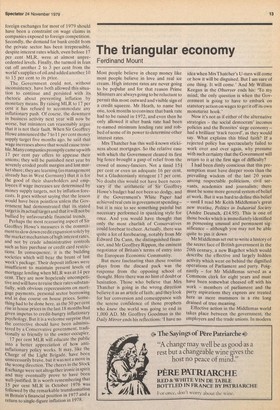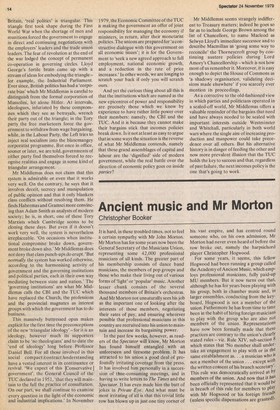The triangular economy
Ferdinand Mount
Most people believe in cheap money like most people believe in love and real ice cream. High interest rates are never going to be popular and for that reason Prime Ministers are always going to be reluctant to permit this most outward and visible sign of a credit squeeze. Mr Heath, to name but one, took months to convince that bank rate had to be raised in 1972, and even then he only allowed it after bank rate had been re-named minimum lending rate and robbed of some of its power to determine other interest rates.
Mrs Thatcher has this well-known stickiness about mortgages. So the relative ease with which the Government cleared its first big fence brought a gasp of relief from the crowd of money-fanciers. Not a timid 151 per cent or even an adequate 16 per cent, but a Gladstonianly stringent 17 per cent. No doubt this would not have been necessary if the arithmetic of Sir ' Geoffrey Howe's budget had not been so dodgy, and if the Government's White Paper had achieved real cuts in government spending— but it is nice to see. something painful but necessary performed in spanking style for once. And you would have thought that only the most churlish of Conservatives could forebear to cheer. Actually, there was quite a lot of forebearing, notably from Mr Edward Du Cann, the distinguished financier, and Mr Geoffrey Rippon, the eminent negotiator of Britain's terms of entry into the European Economic Community.
But more fascinating than these routine plays from the discard pack was the response from the opposing school of thought. Here there was no hint of doubt or hesitation. Those who believe that Mrs Thatcher is going in the wrong direction believe it as an article of faith; and they look for her conversion and comeuppance with the serene confidence of those prophets who knew the world was going to end in 1,000 AD. Mr Geoffrey Goodman in the Daily Mirror ends his reflections: 'I have no idea when Mrs Thatcher's U-turn will come or how it will be disguised. But I am sure of one thing. It will come.' And Mr William Keegan in the Observer ends his: 'To my mind, the only question is when the Government is going to have to embark on statutory action on wages to get it off its own monetarist hook.'
Now it's not as if either of the alternative strategies — the social democrats' incomes policies and the Bennites' siege economy — had a brilliant 'track record', as they would say. What explains this blind faith? If a rejected policy has spectacularly failed to work over and over again, why presume with such certainty that the Government will return to it at the first sign of difficulty?
I had been dimly conscious that this presumption must have deeper roots than the prevailing wisdom of the last 20 years among respectable politicians, civil servants, academics and journalists; there must be some more general system of belief at work. But it was hard to define this belief — until I read Mr Keith Middlemas's great new treatise, Politics in Industrial Society (Andre Deutsch, £14.95). This is one of those books which is immediately identified as possessing unusual and permanent sig nificance — although you may not be able quite to pin it down Mr Middlemas set out to write a history of the secret face of British government in the 20th century, a new Bagehot which would describe the effective and largely hidden activity which went on behind the dignified operations of Parliament and party. Poignantly — for Mr Middlemas served as a Commons clerk for eight years and must have been somewhat cheesed off with his work — members of parliament and the party aspirations they express are treated here as • mere mummers in a rite long drained of true meaning. Effective action in the Middlemas world takes place between the government, the employers and the trade unions. In modern Britain, 'real politics' is triangular. This triangle first took shape during the First World War when the shortage of men and munitions forced the government to engage in direct and continuing negotiations with the employers' leaders and the trade union leaders. The fear of revolution at the end of the war lodged the concept of permanent co-operation in governing circles. Lloyd George's fertile brain came up with a stream of ideas for embodying the triangle — for example, the Industrial Parliament. Ever since, British politics has had a 'corporate bias' which Mr Middlemas is careful to distinguish from the formal corporation of Mussolini, let alone Hitler. At intervals,. ideologues, infuriated by these compromises which they see as betrayals, wrench their party out of the triangle; in the Tory party the free marketeers force the government to withdraw from wage bargaining, while, in the Labour Party, the Left tries to inject real socialism into the blancmangey corporatist programme. But once in office, sooner or later, we are told, governments of either party find themselves forced to recognise realities and engage in some kind of triangular arrangement.
Mr Middlemas does not claim that this system is admirable or even that it works very well. On the contrary, he says that it involves deceit, secrecy and manipulation of public opinion and that it only blankets class conflicts without resolving them. He finds Habermas and Gramsci more convincing than Adam Smith as analysts of modern society; he is, in short, one of these Tory Marxists which Cambridge seems to be cloning these days. But even if it doesn't work very well, the system is nevertheless irreplaceable. 'On occasions when institutional compromise broke down, government broke down also.' Mr M iddlem as does not deny that class punch-ups do erupt. 'But normally the system has worked otherwise, according to the harmonising activity of government and the governing institutions and political parties, each in their own way mediating between state and nation.' The 'governing institutions' are what Mr Middlemas calls the CBI and the TUC which have replaced the Church, the professions and the provincial magnates as interest groups with which the government has to do business.
This massively buttressed opus makes explicit for the first time the preconceptions of the new 'triangular ideology' — for it is an ideology, however much its supporters claim to be `no theologians' and to date the 'end of ideology' long before Professor Daniel Bell. For all those involved in this social compact /contract/understanding have a vested interest in its continuance or revival. 'We expect of this [Conservative government', the General Council of the TUC declared in 1951, 'that they will maintain to the full the practice of consultation. On our part, we shall continue to examine every question in the light of the economic and industrial implications.' In November 1979, the Economic Committee of the TUC is making the government an offer of joint responsibility for managing the economy if • ministers, in return, alter their monetarist • policies. The unions are prepared for 'a constructive dialogue with this government on all economic issues'; it is for the Government to 'seek a new agreed approach to full employment, national economic growth, and a reduction in the rate of price increases.' In other words, we are longing to scratch your back if only you will scratch ours.
And yet the curious thing about all this is that the institutions which are named as the new epicentres of power and responsibility are precisely those which we know by experience to have rather little power over their members: namely, the CBI and the TUC. And it is because they cannot make their bargains stick that incomes policies break down. Is it not at least as easy to argue that in some ways the situation is the reverse of what Mr Middlemas contends, namely that these grand assemblages of capital and labour are the 'dignified' side of modern government, while the real battle over the direction of economic policy goes on inside parties? Mr Middlemas seems strangely indifferent to Treasury matters; indeed he goes so far as to include George Brown among the list of Chancellors, to name Macleod as Selwyn Lloyd's immediate successor and to describe Macmillan as 'going some way to reconcile' the Thorneycroft group by continuing austere policies during Lord Amory's Chancellorship — which is not how most of us remember it. Moreover, it is easy enough to depict the House of Commons as 'a shadowy organisation, validating decisions made elsewhere' if you scarcely ever mention its proceedings.
As a corrective to the old-fashioned view in which parties and politicians operated in a sealed-off world, Mr Middlemas offers a valuable reminder of the bargains that need and have always needed to be sealed with important interests outside Westminster and Whitehall, particularly in both world wars where the single aim of increasing production and manpower could take precedence over all others. But his alternative history is in danger of feeding the other and now more prevalent illusion that the TUC holds the key to success and that, regardless of past failure, the next incomes policy is the one that's going to work.



































 Previous page
Previous page